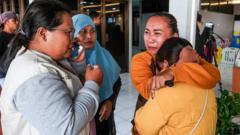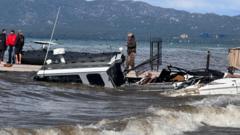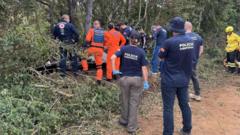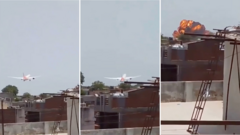Five people, including a child, were safely rescued after enduring a terrifying 36 hours stranded on the wreckage of their small plane in an alligator-infested swamp in Bolivia's Amazonas region. The aircraft was forced to make an emergency landing following an engine malfunction while flying from Baures to Trinidad. The survivors, all in "excellent condition," managed to avoid the lurking alligators by using strategically placed fuel, and they survived on cassava flour until local fishermen located them. Authorities expressed gratitude for the successful collaboration among rescue teams, highlighting the role of community in the emergency operation.
Survivors Found in Swamp After Plane Crash Amid Alligator Threats
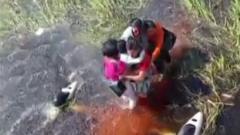
Survivors Found in Swamp After Plane Crash Amid Alligator Threats
Five individuals endure harrowing 36 hours on a submerged plane in Bolivia's alligator-filled swamp.
The incident unfolded when the plane, piloted by 29-year-old Andres Velarde, experienced sudden engine failure, leading to an emergency descent into a swamp near the Itanomas River. After disappearing from radar, a crucial search operation was launched on Thursday, with local fishermen ultimately finding the stranded survivors on Friday, over 48 hours later. Velarde recounted the precarious situation of standing on top of the submerged plane with alligators swimming dangerously close, reflecting on their reliance on the leaking petrol as a deterrent against the predators.
While the survivors had no access to fresh water, they were able to sustain themselves with cassava flour brought by one of the passengers, illustrating the unpredictability of survival in such extreme circumstances. Upon their rescue, a helicopter transported the group to a hospital for medical evaluation, ensuring their quick recovery. Local health officials, including Ruben Torres from the Beni Region Health Department, acknowledged the emotional toll the incident had on families and stressed the community's effective response in uniting efforts to find the missing individuals. The story serves as a stark reminder of the challenges posed by Bolivia's wild terrains and the extraordinary resilience of the human spirit in the face of life-threatening circumstances.
While the survivors had no access to fresh water, they were able to sustain themselves with cassava flour brought by one of the passengers, illustrating the unpredictability of survival in such extreme circumstances. Upon their rescue, a helicopter transported the group to a hospital for medical evaluation, ensuring their quick recovery. Local health officials, including Ruben Torres from the Beni Region Health Department, acknowledged the emotional toll the incident had on families and stressed the community's effective response in uniting efforts to find the missing individuals. The story serves as a stark reminder of the challenges posed by Bolivia's wild terrains and the extraordinary resilience of the human spirit in the face of life-threatening circumstances.


